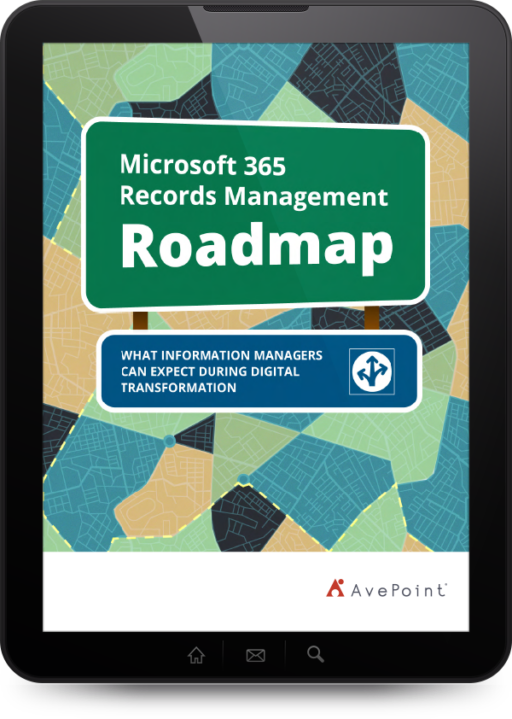Information Lifecycle Management
Ensure the integrity of your collaboration workspaces and content
Our holistic approach to records and information management means we've got you covered from start to finish


Get it—and keep it—together
In order to apply appropriate information lifecycle management policies, organizations must accurately capture, track, and record all Microsoft 365 collaborative workspaces as they are created. Additionally, they must have measures in place to address the redundant, obsolete, and trivial content left behind by short-lived projects. This ROT content not only hinders productivity which results in user frustration, it also creates unnecessary risk exposure. As a best practice, organizations need to action lifecycle outcomes when content is no required for business purposes or by law.
Reduce risk
Protect your organization by ensuring that you’re not holding on to too much — or too little — information.
Decrease storage costs
Data volume is growing rapidly. Reduce storage costs and mitigate overage fees by purging extraneous content.
Optimize efficiency
Get rid of ROT to drive productivity, and improve the speed and accuracy of search, analytics, and e-discovery solutions.


Rest easy knowing that your Microsoft 365 workspaces and content are under control
- MANAGE YOUR WORKSPACES
Scale. Automate. Secure.
For good governance, balance collaboration and control.
With AvePoint’s Cloud Governance, you can empower users to create Teams, Sites and Groups in real-time, backed by a sustainable, efficient, and secure governance framework. From the very moment a Microsoft 365 workspace is provisioned, it enters the lifecycle management process. Organizations can right-size their policies to ensure that provisioned assets have correct classification, retention, metadata, and access controls in place from the outset. Going forward, workspace owners can also be automatically asked to review permissions and metadata and revise or confirm as necessary.
Oversee configuration settings, membership, and ownership change requests, with the ability to delete, revert, or notify of unauthorized changes
Improve data quality and speed up processes with automated, structured end-of-life processes that trigger alerts for potentially idle or irrelevant sites and content
Ask workspace owners to explicitly confirm extend a workspace’s lease or flag it for managed disposition
- COMMAND YOUR CONTENT
Good business is based on good information.
Your information is an asset. Turn it into an advantage.
Just as workspaces must go through an information lifecycle process, the content within them should be subject to the same. With Cloud Records, you can easily automate business rules to manage your entire content lifecycle—from creation to classification and retention—without user intervention. Achieve compliance with your company’s own policies as well as rapidly changing regulatory requirements at the local, state, and federal level.
Manage electronic content from Microsoft 365, SharePoint on-premises, Exchange Online, social media, and file systems directly alongside physical records
Draw upon comprehensive out-of-the-box reporting to understand the current state of lifecycle processes, easily adjusting approvals, terms, policies, and more
Use delegated administration capabilities to permit defined groups or users to manage content repositories and access security-trimmed search results and reporting
- MIGRATE TO THE MODERN
Discover. Migrate. Monitor.
Drive digital transformation with Office 365 migration.
Our Fly migration solution enables organizations to seamlessly migrate their on-premise files directly into Microsoft 365. Detailed pre-migration discovery reports allow the organization to manage and maintain metadata, permissions, and complex data structures. Integrate legacy data into modern information management frameworks by filtering and restructuring content as it moves into Microsoft 365.
With automated data synchronization, Fly captures changes throughout the duration of the migration product.
Remap metadata, domains, and other information during the migration process
Ensure that legacy information being moved into Microsoft 365 is in line with data governance and information management policies

Microsoft 365 Records Management Roadmap
Maintain Governance and Information Integrity During a Digital Transformation
The COVID-19 pandemic accelerated the need for businesses to enable hybrid and remote work. As cloud-based collaboration solutions have proliferated, records and information management practices must evolve accordingly.
GET THE EBOOKLearn how to navigate common records compliance requirements,
Create retention and disposal schedules, and
Ensure secure information management
DOWNLOADS & RESOURCES
Record Management in Microsoft Teams: Real World Approaches
As Teams usage has skyrocketed, information managers have been challenged to accurately capture, classify and store the many data types that comprise a Team. Learn how leading organizations are solving for this struggle. Watch on-demand.
FREE EBOOK
The Value of Automated Office 365 & Microsoft Teams Governance
The MOST comprehensive resource on Microsoft 365 Governance

Intelligent Information Management Solutions
Cloud Governance
Implement an extensible Office 365 governance strategy that empowers users, is easy to maintain and scales as your organization adopts to the cloud.
Cloud Records
Manage Microsoft 365 content and physical records together. Create and oversee classification schemes, as well as flexible retention and disposal rules.
Fly
Validate that your data is used as intended and tagged correctly, to enable robust information management, compliant migration, and more.
Cloud Archiving
Optimize Cloud storage and manage information lifecycles. Reduce storage costs and improve data quality and information management in M365.
MyHub
Simplify your users collaboration experience. Provide them with a one-stop-shop to all their Teams, Groups, Sites, and Communities, directly from Microsoft Teams.


